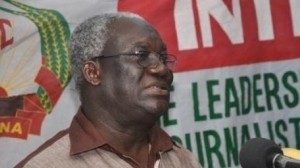Warning: Undefined array key "dirname" in /home/anapuafm/public_html/wp-content/themes/anapuafm/include/plugin/filosofo-image/filosofo-custom-image-sizes.php on line 133
Warning: Undefined array key "extension" in /home/anapuafm/public_html/wp-content/themes/anapuafm/include/plugin/filosofo-image/filosofo-custom-image-sizes.php on line 134
TUC slams 2014 budget
 The Ghana Trades Union Congress (TUC) has expressed concern over what it terms the silence of the 2014 Budget on employment creation.
The Ghana Trades Union Congress (TUC) has expressed concern over what it terms the silence of the 2014 Budget on employment creation.
It said the “government has once again confirmed to Ghanaians that when it comes to employment, it is a matter for manifestos and not a serious macroeconomic issue for its consideration.”
A statement signed by its Secretary General, Mr Kofi Asamoah, said inflation-targeting objective remained against the background that the most pressing issue for Ghanaians was that they and their children educated at great cost and gained productive employment that delivered fair incomes.
It said those observations were the interim issues the TUC had with the 2014 budget and pledged to come up with a comprehensive report stating its views and positions on the policy underpinnings of the budget and the proposals therein.
Budget Tradition
It noted that the 2014 Budget Statement and Economic Policy followed in the tradition of telling Ghanaians about economic growth as measured by GDP, inflation and other macroeconomic indices.
The statement said over the years, in its engagements on the budget with the government, the TUC had called for a change in the way economic policy had been conducted in Ghana over the last 30 years.
“Specifically, we have called for a break from the neo-liberal overemphasis on price stability. We have suggested an alternative approach of employment targeting to economic policy,” it said.
It said the TUC, however, welcomed the choice of four priority sectors on which oil and gas revenues were to be spent for the next three years in line with the Petroleum Revenue Management Law (Act 815).
“But the budget maintained a loud silence about how we have fared in terms of the previous four priority sectors on which we had spent petroleum revenue since 2011. We had expected the government to tell Ghanaians the status of the road projects on which huge sums of petroleum revenue were applied,” it said.
Agriculture and Wages
On agriculture, the statement said its performance over the last three years did not reflect the huge resources that had been pumped into agricultural modernisation from the oil revenue and, therefore, called for proper accounting for past revenues that had been spent from our oil.
“Without that, we are likely to squander another huge sum with these new priority areas,” it said.
On public sector wages, it said the TUC welcomed proposals in the 2014 Budget to enhance the implementation of the Single Spine Pay Policy (SSPP).
“The TUC and its affiliates in the public sector are willing and prepared to support the government and the Fair Wages and Salaries Commission (FWSC) in this direction. We are, however, concerned with the continued delay in the review of allowances,” it stated.
The statement called on the government, the FWSC and the other social partners to ensure that negotiations on public sector base pay and the national minimum wage were concluded on time.
That, it explained, would forestall the accumulation of huge arrears and the challenges associated with them in the public sector.
Housing
On housing, it said in the last five years annual budgets had contained proposals for the completion of existing and the construction of new affordable housing projects but “government’s commitment to affordable housing appears to be rhetoric, as nothing concrete appears to be done to address the housing deficit in Ghana”.
It said given the dire need for affordable housing, it called on the government to implement the proposals on affordable housing contained in the 2014 Budget Statement and Economic Policy.
“The TUC is also concerned with implementation levels of annual budgets and economic policy statements. In spite of all the challenges we have had with budgets and the policy underpinnings in the last three decades, we firmly believe that budget proposals have been most hampered by poor implementation,” it noted.
“The execution rate has been low and large-scale inefficiencies often undermine performance. We urge the government to demonstrate commitment to the implementation of the budget by releasing resources to the appropriate agencies on time,” it stated.


